
Save this storySave this storySave this storySave this story
As yet, we cannot tell whether 2023 will be remembered for the movies that we saw or for the movies that were hobbled and hog-tied by industrial action. The strikes called by SAG-AFTRA and the Writers Guild of America caused productions to be paused and release dates to be pushed back. If you missed Jeff Nichols’s new film, “The Bikeriders,” with Austin Butler and Tom Hardy, when it kicked off the Telluride Film Festival, at the end of August, but hoped to see it when it opened in early December, tough. Having been passed from one studio to another—20th Century Studios to Focus Features—like a difficult foster child, the movie will now be sent forth into the world next year. (It’s worth the wait.) Amid this gloom, there were sparks of cheering news; not all artistic endeavors fell afoul of the strikes. I can’t be the only person who cried for joy upon learning that “Sonic the Hedgehog 3,” as MovieWeb reports, “was able to continue filming without actors present.” The Union of Working Hedgehogs has declined to comment.
Of the many grievances that were voiced by striking actors and writers, the most notable—and the one that linked them most closely to practitioners in other trades—was a dread of artificial intelligence. Whether you’re a star or a background extra, it’s alarming (and vaguely insulting) to realize that your likeness, and your voice, could be cut and pasted from one movie to the next. In which case, will you even need to show up on set? Will you be paid for the pasting? And, should you be so clumsy as to die, will that not simply mean less paperwork for the studios, as they carry on copying you forever, and maybe for free? Ghosts get lousy residuals.
One could hear the fear in the words of industry professionals, as they mused on A.I. “It feels existential and people don’t understand it. It’s new. It’s scary. Everyone is worried that all of a sudden they will be in a sequel to a movie and they are not getting paid for their work.” Such was the verdict, quoted in the Times, of the lawyer Tara Kole, from the law firm Johnson, Shapiro, Slewett & Kole, which represents, among other actors, Emma Watson. The idea of Watson’s performance in the live-action “Beauty and the Beast” (2017) being replicated ad infinitum is, indeed, not a prospect for the faint of heart. In January, moreover, A.I. was used to generate a deepfake recording of Watson apparently reciting passages from “Mein Kampf.” A nasty lark, though it could get worse: in the near future, we could easily be seeing Hitler in the corridors of Hogwarts. No need for a sorting hat, I guess. Slytherin it is.
The most touching of protestations came from Bryan Cranston, who stepped up to the microphone at a SAG-AFTRA rally in Times Square, on July 25th. Addressing his remarks to Bob Iger, the C.E.O. of Disney, who is every bit as warm and cuddly as you’d expect, Cranston said, “Listen to us when we tell you we will not be having our jobs taken away and given to robots.” The irony is that, for anyone who watches movies rather than makes them, the robots have been in control for quite a while—to be precise, since 2:14 A.M. E.S.T. on August 29, 1997, when an A.I. system called Skynet became self-aware and, by way of a celebration, tricked mankind into almost destroying itself in a nuclear war. That’s what Arnold Schwarzenegger told us, anyway, in “Terminator 2: Judgment Day,” and we all know better than to disagree with him.
As a moviegoer, in other words, you have a choice. Either you do the mature and responsible thing, read the Times, and follow every wrinkle in the story of the unions’ demands, not to mention the preposterous saga of Sam Altman, who has been fired and rehired as C.E.O. of OpenAI, and who thinks that “we’re on a path to self-destruction as a species right now.” (Très Skynet.) Alternatively, you go to the cinema and forget your troubles—or, at any rate, see them nicely wrapped up and dramatized for your entertainment. Thus, in this year’s “Mission: Impossible—Dead Reckoning Part One,” the villain isn’t the bad guy with the good hair who dukes it out with Tom Cruise on the roof of a speeding train. The villain is A.I., in the guise of the Entity, described as a “self-learning, truth-eating digital parasite.” Kind of like your iPhone, but bigger.
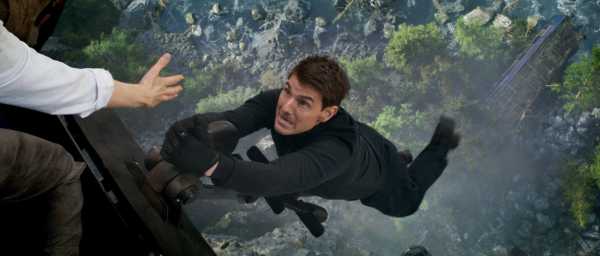
In “Mission: Impossible—Dead Reckoning Part One,” the villain is A.I., in the guise of the Entity.Photograph from Alamy
In the movie’s most surprising reveal, we get to see the Entity for ourselves. I always imagined that A.I. was something in the air, like love or smallpox or Eau Sauvage, but no. Here it is, in “Dead Reckoning,” at an awkward social gathering in Venice: a vast wall on which multiple dots of light pulsate and swarm. It dimly resembles a murmuration of starlings, at dusk, without being a fraction as beautiful or as mysterious in its intent. Unwittingly, the movie has bumped into the fact that A.I. has a major image problem. The more frightening you try to make it onscreen (or, I suspect, in fiction), the blander it becomes. One pines for the days when wickedness took the plump and tangible form of a man named Goldfinger, whose only digital ambition was to get his fingers on gold.
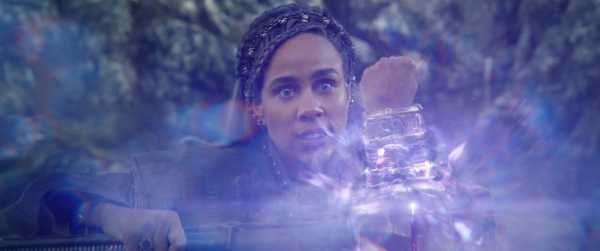
“The Marvels,” which came out in November, has proved to be the most financially feeble offering in the M.C.U. franchise to date.Photograph courtesy Marvel Studios / Disney
The Marvel Cinematic Universe, needless to say, boasts its own form of A.I., referred to as the Supreme Intelligence. As fans will remind you with a weary sigh, it governs, or used to govern, the Kree. (What do you mean, you aren’t clued up on the Kree? Haven’t you heard of the Skrulls? How about Talos? Where have you been?) Not long ago, apparently, the Supreme Intelligence got smacked down by Captain Marvel (Brie Larson), which suggests that A.I. is not impregnable. When “The Marvels” came out, in November, I hoped for clarification in this vital matter, but nothing about the film was clear. No blame for its failure, which has proved to be the most financially feeble offering in the M.C.U. franchise to date, rests with the determined Larson, who resumes her leading role. All blame attaches to the script, if script it be. To my ears, it sounded as if a bunch of Marvel employees had ordered tequila shots, scribbled down random ideas, tossed them into a hat, plucked them out, and stuck them together with spit.
Yet my visit to “The Marvels” was not wasted. Around the forty-minute mark, I was struck by a heretical and frankly scab-like thought: Why not get A.I. to write these movies? It couldn’t do any worse. Algorithmically, thanks to previous installments, everything is in place: a clear narrative formula, a strong central protagonist, and the interminable trappings of cosmic bullshit. If human brains can’t wrestle all that into some semblance of consistency, so be it. Give ChatGPT a chance.
There is no predicting what will hang around in our heads, as a year of moviegoing recedes. In 2020, I had to wait until Christmas Day for the film that felt like the greatest gift: “Dear Comrades!,” which is about the violent suppression of strikers—factory workers rather than actors or screenwriters—in the Soviet Union in 1962. Such a festive tale. When I think of 2021, by contrast, what remains is “Summer of Soul,” which brought the Harlem Cultural Festival of 1969 (in essence, a better and Blacker Woodstock) out of the shadows. The fact that so funky a film went on to win the Academy Award for Best Documentary was a rare and happy instance of the right prize going to the right product. As a rule, the doling out of shiny prizes is only the flimsiest guide to what will endure.
Such memories as I have of 2022 reside with the private and the quirky—with films like “Petite Maman,” an intricately simple fable of time travel, or “The Worst Person in the World,” about the ups and downs of a young Norwegian woman, with an accent on the downs. (Hands up, anyone else who listened to Art Garfunkel singing “Waters of March” in the closing minutes of that movie and then found, in the ensuing weeks, that the song wouldn’t go away.) That tendency continued into 2023 and acquired a pleasing geographical spread. A rough list of films that I happened to admire would include works from Ireland, Iceland, Pakistan, and Japan—to be specific, “The Quiet Girl,” “Godland,” “Joyland,” and “Monster.” The first is about a nine-year-old dispatched to live with relatives and finding a safe but sad haven; the second shows the trek of an inexperienced priest across landscapes that look primeval; the third follows the romance of a transgender dancer and her hapless suitor in Punjab; and the last introduces a couple of schoolboys, swept up in secrets and lies.
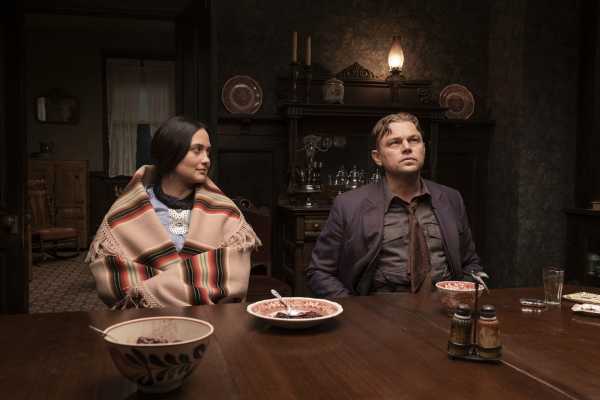
The impetus and the moral nerve of “Killers of the Flower Moon” rests with Mollie (Lily Gladstone), as she arrives at a terrible knowledge.Photograph courtesy Apple TV+
Notice the emphasis on youth. None of the protagonists of those four films (or, for that matter, of “Petite Maman” and “The Worst Person in the World”) have yet reached middle age. Many are just kids. In each case, we are left with a delicate sense of treacherous decades—the bulk of a lifetime—still to come, and, regardless of the period in which the movies are set, that uncertainty, looming ahead, seems all too fitting for our own times. I can hardly recall a single film this year in which the elderly were appealed to, let alone venerated, for their settled wisdom. True, there is the mustering of senior Osage men in “Killers of the Flower Moon,” but the impetus and the moral nerve of that story rests with Mollie (Lily Gladstone), a female figure far younger than them, as the last of her innocence falls away and she arrives at a terrible knowledge.
Gladstone belongs to a formidable crop of actresses who, throughout the year, have held the screen in their thrall. She is joined by Carey Mulligan in “Maestro,” Emma Stone in “Poor Things,” Sandra Hüller in “Anatomy of a Fall” and “The Zone of Interest,” and, in a supporting role, Da’Vine Joy Randolph in “The Holdovers.” If Mulligan, playing Leonard Bernstein’s wife, Felicia Montealegre, stands out in this distinguished company, it may be because “Maestro” is so deftly constructed—darting back and forth in time, and thus affording her the latitude to develop her character against a range of emotional backdrops. (The movie is stuffed with busy dialogue, yet watching it feels more like going to the ballet than attending a play.) Having seen “Maestro” twice, I would nudge you to catch it at the cinema instead of waiting until it immigrates to Netflix, on December 20th. There’s no guarantee that its blend of the ecstatic and the melancholic will survive the trip.
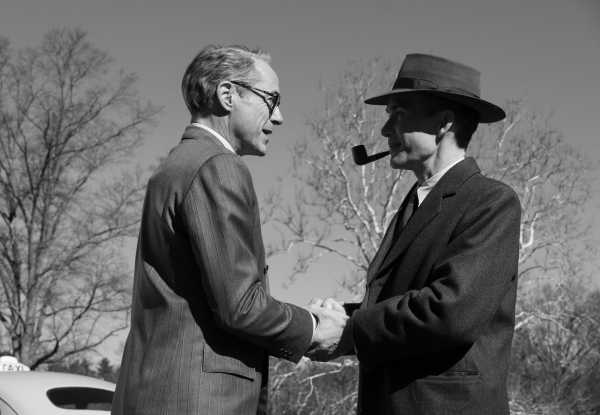
In “Oppenheimer,” Robert Downey Jr. pockets a supporting role and strolls away with the film.Photograph by Melinda Sue Gordon / Courtesy Universal Pictures
To claim that 2023 is adequately represented by “The Quiet Girl,” for all its finesse, would be going too far. Pairing it with “Barbie,” a candy-colored tribute to an unquiet girl, which has raked in more than a billion dollars, would be nearer to the mark. This year, like every year, resounded to a cavalcade of large, loud, and costly motion pictures. One thinks of “Indiana Jones and the Dial of Destiny,” “The Super Mario Bros. Movie,” “The Creator” (which has passages of bewitching grandeur, even as it crumbles into incoherence), “Napoleon,” and, most percussive of all, “Oppenheimer.” The strange thing is that, when I measure the fallout of the latter, what lingers is not the scene of the nuclear test in New Mexico, staged though it was with Christopher Nolan’s canny knack for suspense, so much as the sight of Robert Downey, Jr., who pockets a supporting—not to say confounding—role and strolls away with the film.
If you were to ask me how often I laughed at the movies this year, on the other hand, I would struggle to reply. Once? Twice? This is serious. The rapid decline of comedy on the big screen is a tragedy—a minor one, but a tragedy, nonetheless. (Television is just about holding the fort.) When I did laugh, in recent months, it was not always because the filmmakers had intended to amuse. A straight face was awfully hard to keep, for example, when Bonaparte encounters Francis I of Austria, in Ridley Scott’s “Napoleon,” and remarks how nice it is to meet another emperor. Then, there are those occasions when the joke is nobody’s fault. One occupational hazard of being a movie wonk, with a cranium full of old flicks, is the likelihood that they will sneak in, unbidden, and disturb the peace of a new film. Hence, in “Napoleon,” when somebody accuses Robespierre of being “judge, jury, and executioner,” what came to mind, instantly, was a moment of genius from “Hot Fuzz.”
As 2023 crawls toward its end, what are people actually choosing to view? A bewilderingly mixed bag, I would say. Worshippers with redoubtable eardrums and bladders of steel have made the pilgrimage to cinemas for the sake of “Taylor Swift: The Eras Tour” and “Renaissance: A Film by Beyoncé,” which, when seen back to back, would consume almost six hours of your life. And no movie, current or forthcoming, has engendered the pitch of excitement that arose on December 4th, when the first trailer for “Grand Theft Auto VI” appeared online. Thus far, it has been viewed, on YouTube, more than a hundred and forty-five million times. What the world desires, in short, is a glimpse of a video game, which no one will be able to play until 2025—a game that builds an entire alternative world, glowing with the promise of violence and other fleshly thrills. How can cinema, a rickety old jalopy that started its motor in the early twentieth century, hope to keep pace with that?
The weirdest thing that I beheld this year was created by a filmmaker renowned for his grasp of the all-encompassing epic. Yet it is not a movie, and it is less than five minutes long, and none of us saw it at the cinema. “Now and Then” is a Beatles song, written and recorded by John Lennon, that was considered unfit for purpose. More recently, restorative technology, pioneered by Peter Jackson for his 2021 Beatles documentary, “Get Back,” extracted Lennon’s voice from a demo tape, as if he were being pulled from a hedge. Girded with new material, “Now and Then” became a track—not a great one, but blessed with a suitably heartbreaking chord change on the words “I miss you”—and then a music video, directed by Jackson. In it, we see a compendium of Beatles: old and new, larky and respectful, living and dead. In one shot, the four of them are lined up in a row, as if they were performing the song for us afresh. When I first heard about this project, I said to myself, “Well, that sounds creepy and ghoulish.” When I watched it, I thought, “Yup, that’s creepy and ghoulish all right.” Then I watched it again. And once again. Somewhere around the twelfth viewing, I said out loud, “Jesus Christ, it’s the Beatles.”
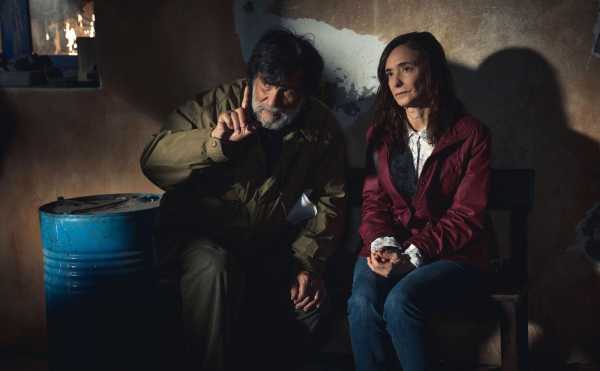
“Close Your Eyes,” by the Spanish director Víctor Erice, a master of his art, is an event.Photograph from Alamy
Oh, and the one film that I genuinely loved in 2023? “Close Your Eyes,” by the Spanish director Víctor Erice. Never a man in a hurry, he summoned forth “The Spirit of the Beehive”—and, in so doing, left many spectators transformed—fifty years ago. Since then, he has made two other movies, and that’s it. Nothing since 1992, unless you count a few short films and a documentary that he co-directed with Abbas Kiarostami. “Close Your Eyes” is therefore an event. It was screened at Cannes and at the New York Film Festival. As yet, however, no date has been set for a U.S. release. Whether the congregation still exists for such a work, and for such a master of his art as Erice, is not for me to judge. Still, do not despair. “The Spirit of the Beehive,” after its première in Spain, took three years to reach New York. So keep your eyes open, and wait. ♦
Sourse: newyorker.com
